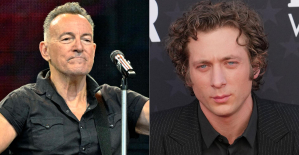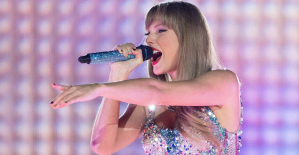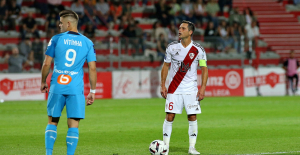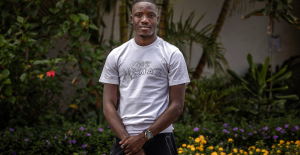Anna Kikina, the only female Russian cosmonaut currently in active service, is part of the Crew-5 crew, also made up of two Americans and a Japanese. This is the fifth regular mission to the Space Station (ISS) carried out by SpaceX on behalf of NASA.
Takeoff is scheduled for noon Wednesday from the Kennedy Space Center in Florida, where the weather is expected to be mild.
Two weeks ago, an American took off aboard a Russian Soyuz rocket to the ISS.
This long-planned astronaut exchange program has been maintained despite the very high tensions between the two countries since Moscow's invasion of Ukraine in February. Ensuring the operation of the ISS has thus become one of the very few subjects of cooperation between the United States and Russia.
Transporting the citizen of another nation is “a huge responsibility,” Kathy Lueders, associate administrator at NASA, told a press conference in late September.
Asked about the current relationship with the Russian space agency Roscomos, she said: "Operationally, we really appreciated the consistency of the relationship, even during a very difficult time geopolitically."
The head of the ISS at NASA, Joel Montalbano, also praised the "excellent support from Roscosmos" for these joint flights.
Anna Kikina, 38 and an engineer by training, will become the fifth Russian female professional cosmonaut to go into space. "I hope that in the near future we will have more women in the corps of cosmonauts," she told AFP in August.
It will also be the first spaceflight for American astronauts Nicole Mann and Josh Cassada, but the fifth for Japan's Koichi Wakata.
After a journey of about 30 hours, their ship will dock Thursday at the Station, which is evolving at an altitude of about 400 km.
Members of Crew-5 will join the seven people already on board (two Russians, four Americans, and one Italian).
A few days of handover are planned with the four members of Crew-4, before they are sent back to Earth.
Crew-5 must spend about five months in orbit, and conduct more than 200 scientific experiments, including more than 70 new aboard the flying laboratory.
Anna Kikina will also be the first Russian to fly in a Falcon 9 rocket designed by billionaire Elon Musk's company.
The latter interfered in discussions on Ukraine on Monday, asking his Twitter followers to vote on his own suggestion to settle the conflict between kyiv and Moscow. This implied in particular the abandonment of the Crimea to Russia. The Ukrainian ambassador to Germany replied, still on Twitter, to go "screw himself".
- Floating future -
Tensions between Moscow and Washington have increased considerably in the space field after the announcement of American sanctions against the Russian aerospace industry, in response to the invasion of Ukraine.
Russia thus announced this summer that it wanted to leave the ISS “after 2024” in favor of the creation of its own orbital station – without however setting a precise date for a withdrawal.
The director of manned flights at Roscosmos, Sergei Krikaliov, declared to him on Monday "hope" that the Russian government agrees to extend participation in the ISS after 2024.
The Americans have already said they want to continue operating the Station until 2030.
As things stand, the ISS cannot function without one of the two segments of which it is made up, one American, the other Russian. The latter ensures in particular the maintenance in orbit thanks to a propulsion system.
Between 2011 and SpaceX's first flight to the ISS in 2020, Russia was the only one able to transport astronauts there to the Station, and charged NASA for places on board its rockets. The loss of this monopoly represents a significant shortfall for the Russian space program.
The exchange of astronauts this year, which must be renewed in the future, is done without financial compensation.

 Sydney: Assyrian bishop stabbed, conservative TikToker outspoken on Islam
Sydney: Assyrian bishop stabbed, conservative TikToker outspoken on Islam Torrential rains in Dubai: “The event is so intense that we cannot find analogues in our databases”
Torrential rains in Dubai: “The event is so intense that we cannot find analogues in our databases” Rishi Sunak wants a tobacco-free UK
Rishi Sunak wants a tobacco-free UK In Africa, the number of millionaires will boom over the next ten years
In Africa, the number of millionaires will boom over the next ten years WHO concerned about spread of H5N1 avian flu to new species, including humans
WHO concerned about spread of H5N1 avian flu to new species, including humans New generation mosquito nets prove much more effective against malaria
New generation mosquito nets prove much more effective against malaria Covid-19: everything you need to know about the new vaccination campaign which is starting
Covid-19: everything you need to know about the new vaccination campaign which is starting The best laptops of the moment boast artificial intelligence
The best laptops of the moment boast artificial intelligence Bitcoin halving: what will the planned reduction in emissions from the queen of cryptos change?
Bitcoin halving: what will the planned reduction in emissions from the queen of cryptos change? The Flink home shopping delivery platform will be liquidated in France
The Flink home shopping delivery platform will be liquidated in France Bercy threatens to veto the sale of Biogaran (Servier) to an Indian industrialist
Bercy threatens to veto the sale of Biogaran (Servier) to an Indian industrialist Switch or signaling breakdown, operating incident or catenaries... Do you speak the language of RATP and SNCF?
Switch or signaling breakdown, operating incident or catenaries... Do you speak the language of RATP and SNCF? Who’s Who launches the first edition of its literary prize
Who’s Who launches the first edition of its literary prize Sylvain Amic appointed to the Musée d’Orsay to replace Christophe Leribault
Sylvain Amic appointed to the Musée d’Orsay to replace Christophe Leribault Jeremy Allen White to play Bruce Springsteen for biopic
Jeremy Allen White to play Bruce Springsteen for biopic In Los Angeles, Taylor Swift hides clues about her new album in a library on the street
In Los Angeles, Taylor Swift hides clues about her new album in a library on the street Skoda Kodiaq 2024: a 'beast' plug-in hybrid SUV
Skoda Kodiaq 2024: a 'beast' plug-in hybrid SUV Tesla launches a new Model Y with 600 km of autonomy at a "more accessible price"
Tesla launches a new Model Y with 600 km of autonomy at a "more accessible price" The 10 best-selling cars in March 2024 in Spain: sales fall due to Easter
The 10 best-selling cars in March 2024 in Spain: sales fall due to Easter A private jet company buys more than 100 flying cars
A private jet company buys more than 100 flying cars This is how housing prices have changed in Spain in the last decade
This is how housing prices have changed in Spain in the last decade The home mortgage firm drops 10% in January and interest soars to 3.46%
The home mortgage firm drops 10% in January and interest soars to 3.46% The jewel of the Rocío de Nagüeles urbanization: a dream villa in Marbella
The jewel of the Rocío de Nagüeles urbanization: a dream villa in Marbella Rental prices grow by 7.3% in February: where does it go up and where does it go down?
Rental prices grow by 7.3% in February: where does it go up and where does it go down? With the promise of a “real burst of authority”, Gabriel Attal provokes the ire of the opposition
With the promise of a “real burst of authority”, Gabriel Attal provokes the ire of the opposition Europeans: the schedule of debates to follow between now and June 9
Europeans: the schedule of debates to follow between now and June 9 Europeans: “In France, there is a left and there is a right,” assures Bellamy
Europeans: “In France, there is a left and there is a right,” assures Bellamy During the night of the economy, the right points out the budgetary flaws of the macronie
During the night of the economy, the right points out the budgetary flaws of the macronie These French cities that will boycott the World Cup in Qatar
These French cities that will boycott the World Cup in Qatar Tour of the Alps: Simon Carr takes on the 4th stage of the Tour of the Alps, marked by a big scare
Tour of the Alps: Simon Carr takes on the 4th stage of the Tour of the Alps, marked by a big scare Cycling: in video, Chris Harper's big scare on the 4th stage of the Tour des Alpes
Cycling: in video, Chris Harper's big scare on the 4th stage of the Tour des Alpes Football: Mathieu Coutadeur will retire at the end of the season
Football: Mathieu Coutadeur will retire at the end of the season Athletics: young Tebogo says African sprinters will dominate the season
Athletics: young Tebogo says African sprinters will dominate the season


















